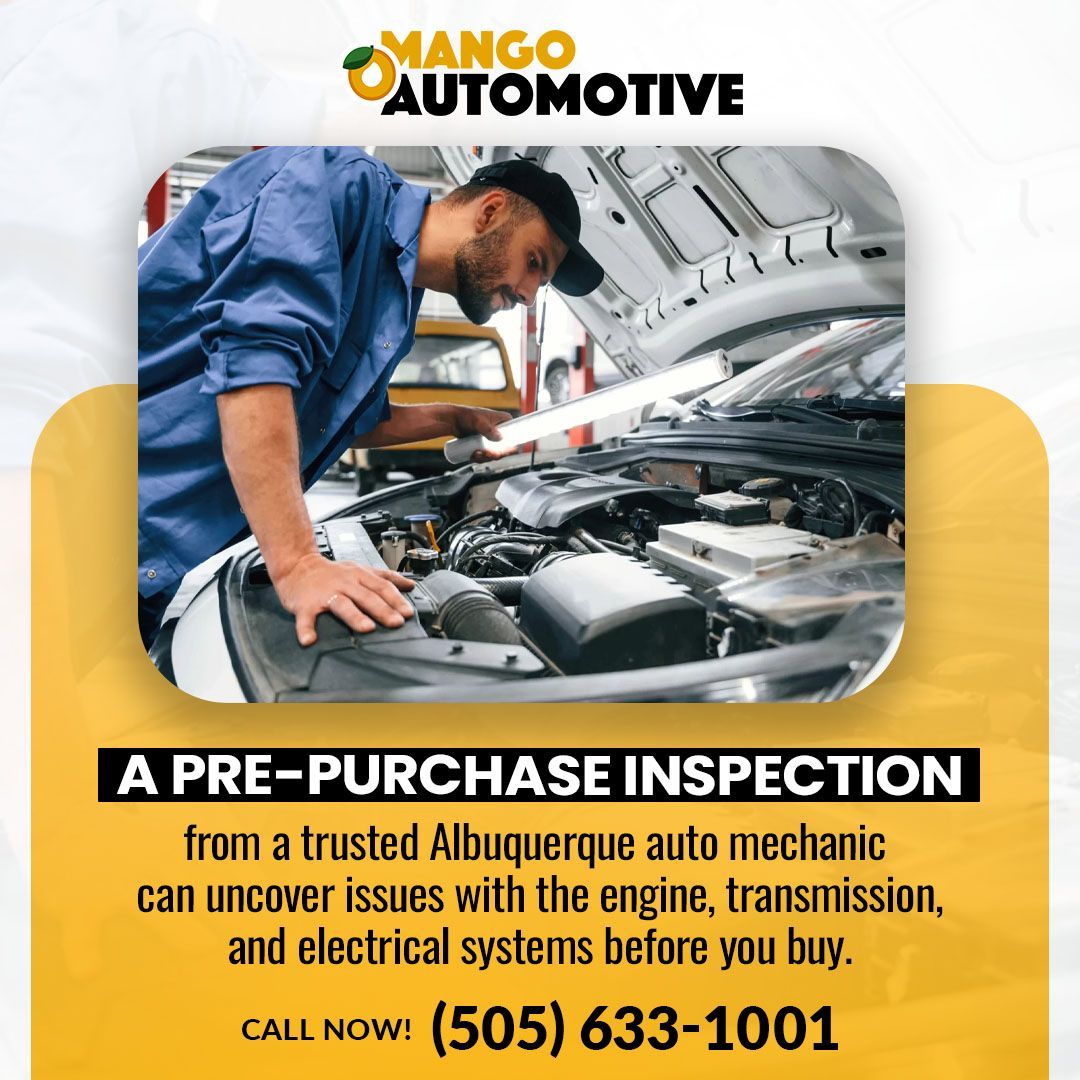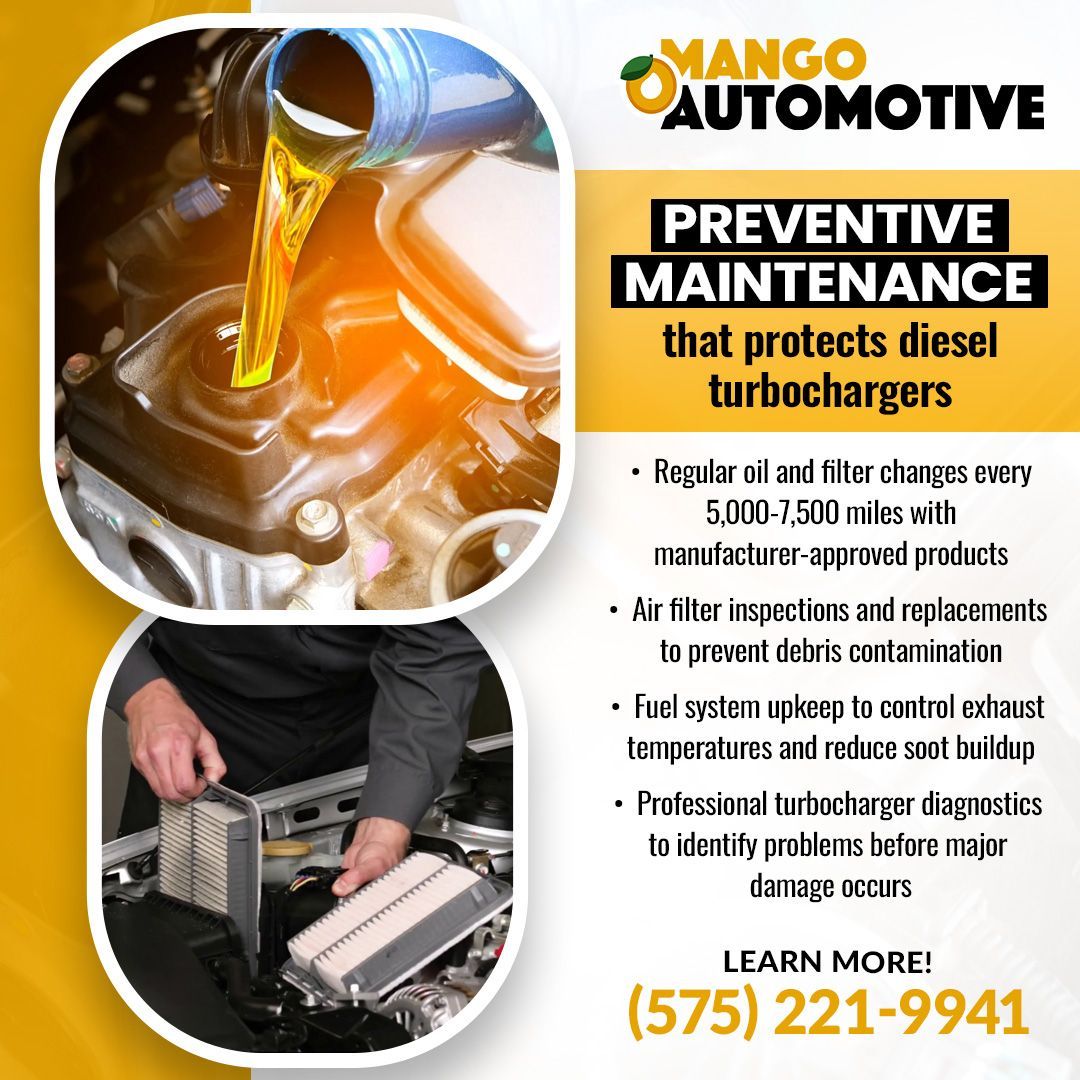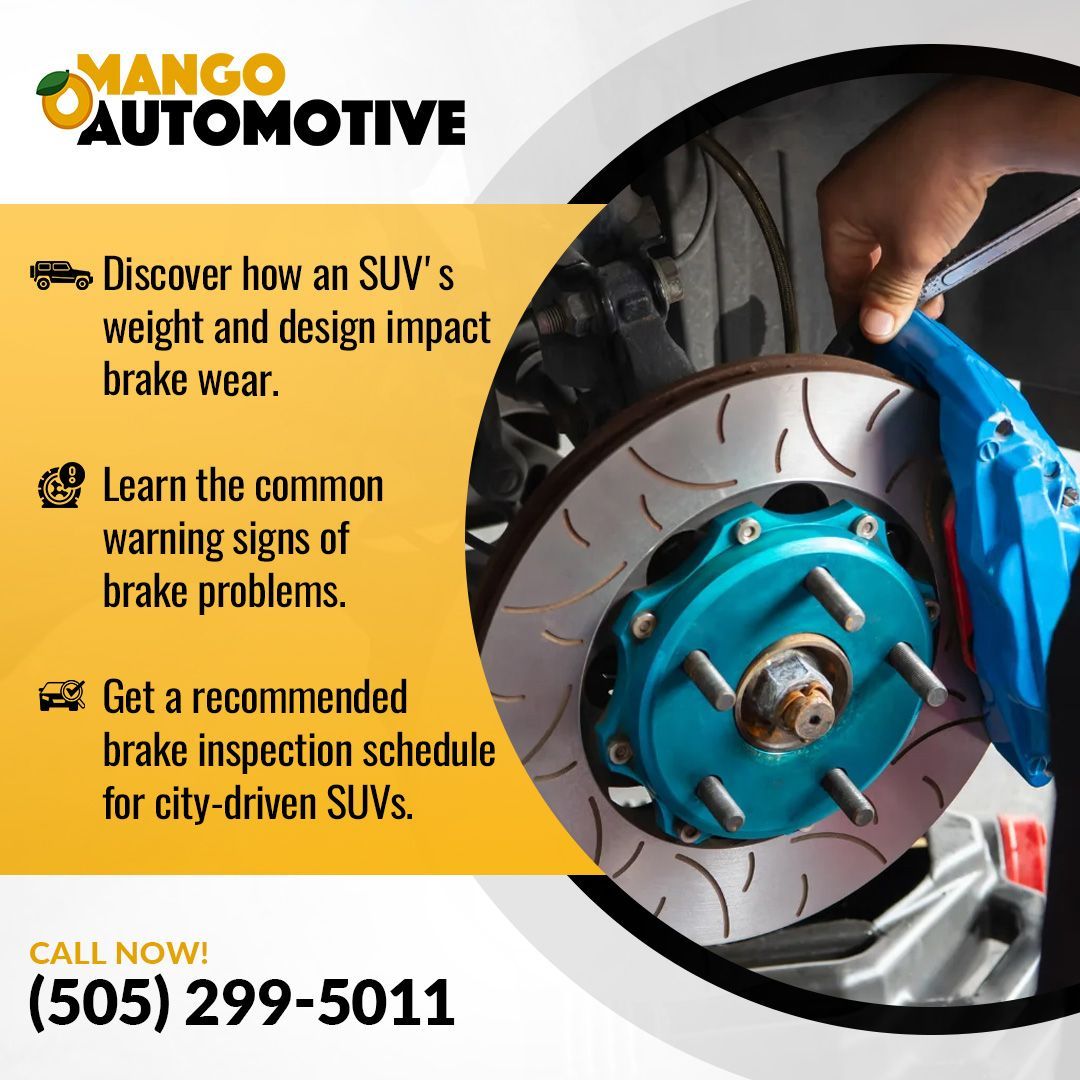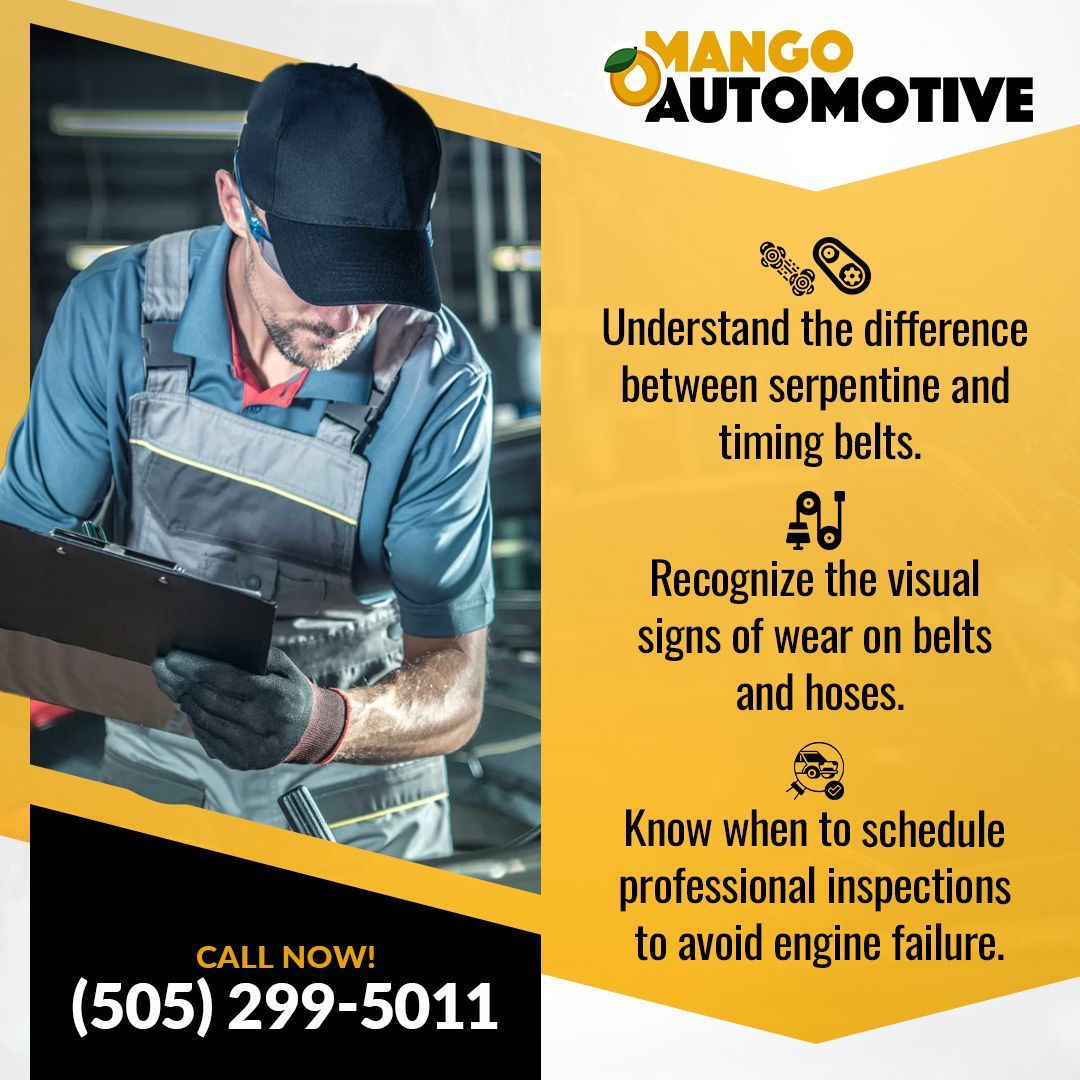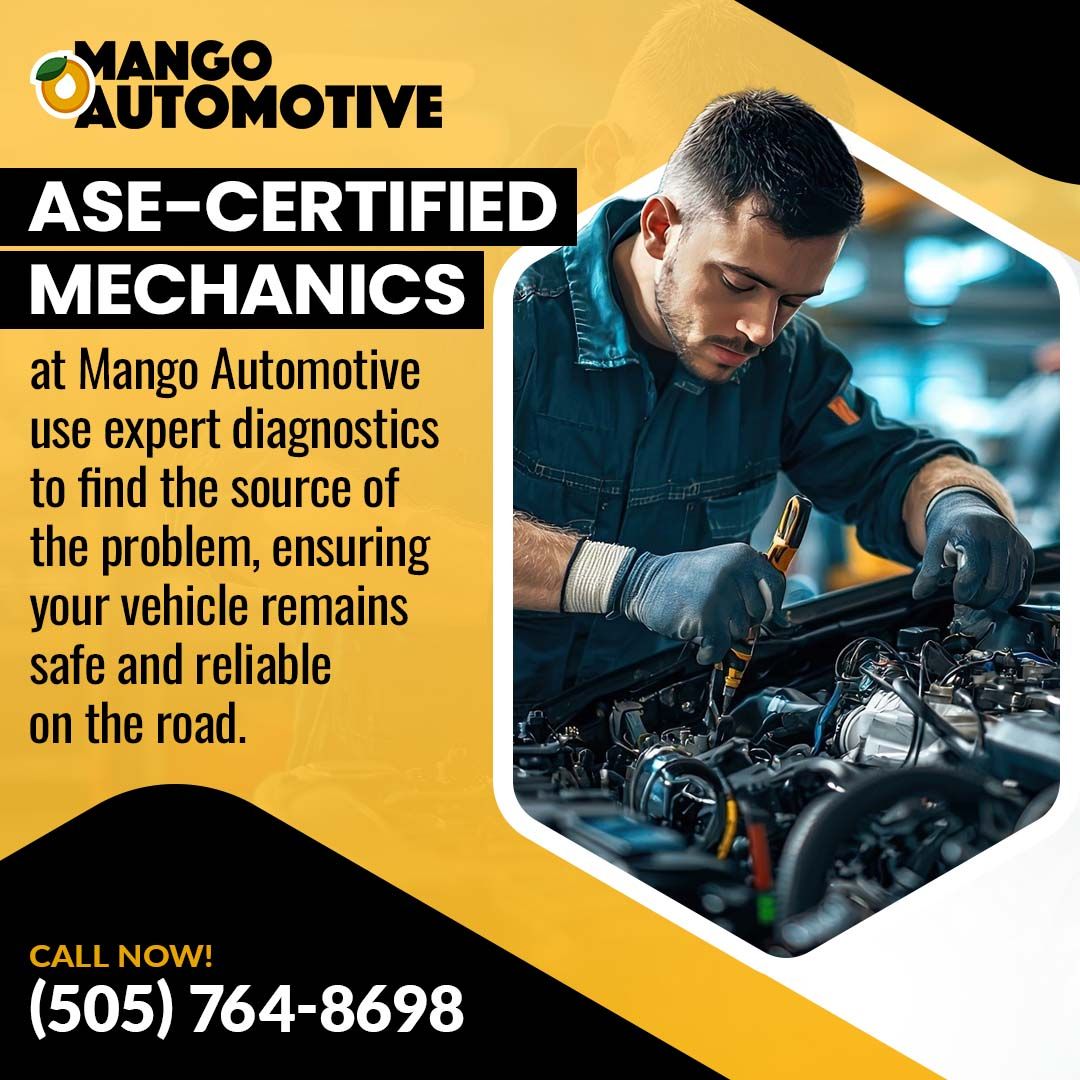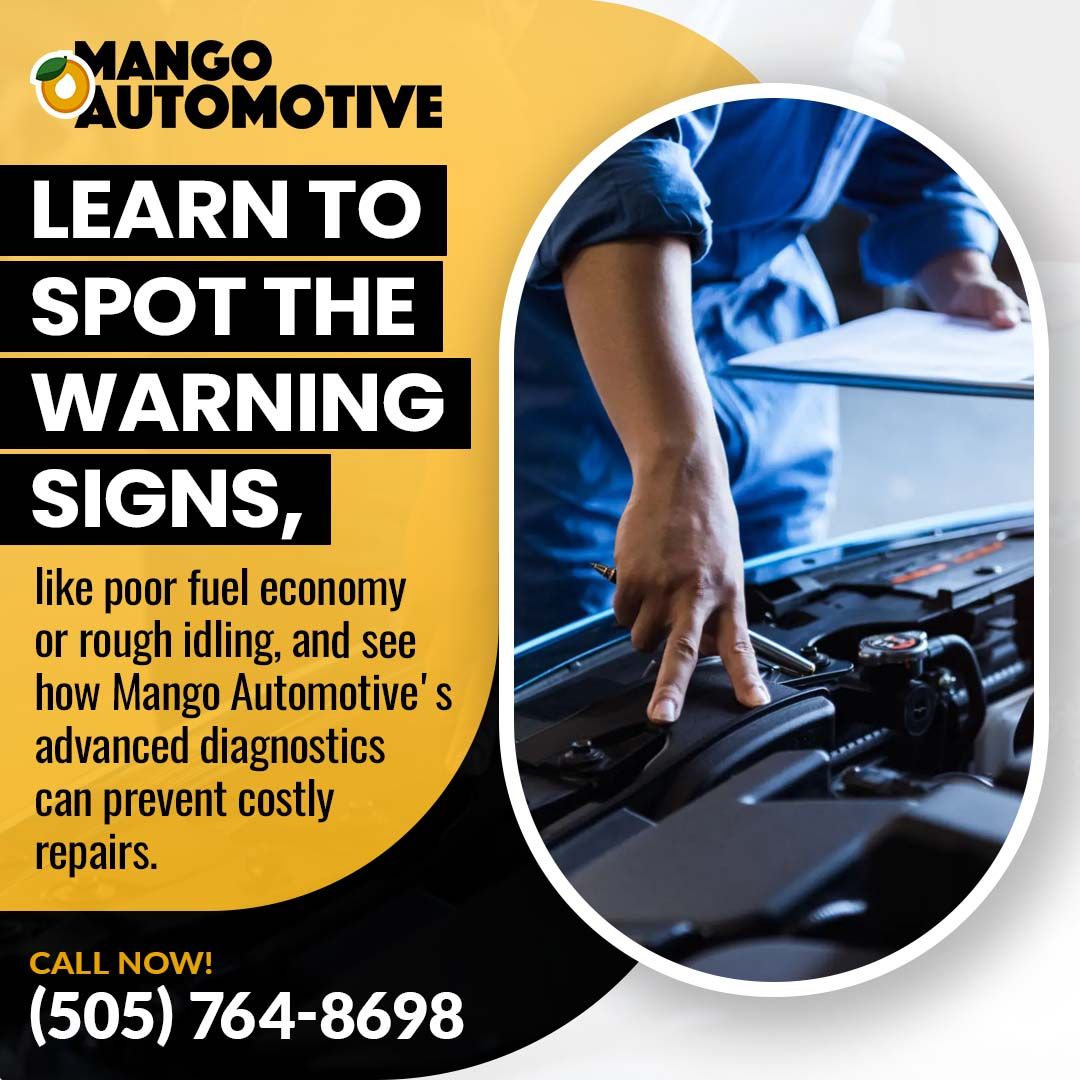The Role of Regular Car Inspections in Avoiding Costly Automotive Repairs
Regular vehicle inspections identify problems before they become expensive repairs. Scheduled inspections catch worn brake pads, fluid leaks, and failing components early, saving drivers from major breakdowns. Professional technicians use diagnostic equipment to detect issues that appear minor but could lead to significant problems if ignored.
Vehicles in Albuquerque face challenges such as high desert heat, dust, and stop-and-go traffic, which accelerate the wear on engines, brakes, and cooling systems. These conditions make routine inspections more important for local drivers who want to protect their investment and avoid unexpected breakdowns.
At
Mango Automotive (Downtown), we've served Albuquerque since 2021 with thorough vehicle inspections that catch problems early. Our certified
automotive repair technicians use modern diagnostic tools to examine every system in your car, from engine performance to brake condition. This proactive approach helps drivers avoid the stress and expense of emergency repairs.

Understanding Vehicle Inspection Types
State-Required Emissions Testing
New Mexico requires emissions testing for most vehicles in Bernalillo County. All 1991 and newer motor vehicles weighing under 10,000 pounds must undergo testing every two years before registration or at change of ownership. Gas-electric hybrid vehicles are also required to be tested every two years.
The emissions inspection measures pollutants released by your exhaust system. Vehicles that fail cannot be registered until repairs bring emissions within legal limits. This testing helps reduce air pollution and verifies that emission control systems function properly.
Dedicated electric vehicles and diesel vehicles are exempt from emissions testing. New vehicles purchased from a dealership remain exempt for four years following initial registration from the date on the manufacturer's certificate of origin.
Preventive Maintenance Inspections
A multi-point inspection examines your vehicle's condition beyond legal requirements. Technicians check fluid levels, battery health, belt condition, hose integrity, and suspension components. This thorough examination identifies wear patterns and potential failures before they cause breakdowns.
These inspections differ from state requirements because they focus on preventing future problems rather than confirming minimum safety standards. A certified technician might discover a coolant leak that hasn't caused overheating yet, or brake pads worn to 30% that will need replacement within 5,000 miles.
Mango Automotive specializes in preventative auto repair in Downtown Albuquerque, offering thorough inspections that catch problems before they become expensive emergencies. Our approach focuses on protecting your investment through regular maintenance and early problem detection.
Recommended Inspection Frequency
Most vehicles benefit from professional inspection once or twice yearly. This schedule catches problems early and maintains vehicle reliability. The specific timing depends on vehicle age, mileage, and driving conditions.
Newer vehicles with fewer than 50,000 miles generally need less frequent inspection. Built-in maintenance reminder systems alert drivers when service is due based on driving patterns. These vehicles typically need inspection during scheduled maintenance intervals every 5,000 to 7,500 miles.
Older vehicles require more frequent attention. Cars with over 100,000 miles experience more wear and tear, making problems more likely. These vehicles should be inspected more frequently and whenever unusual symptoms appear.
Impact of Local Driving Conditions
Albuquerque's extreme heat, dust, and urban traffic qualify as severe operating conditions. These factors stress engines, cooling systems, and brakes more than normal driving. Vehicles operated in these conditions need more frequent inspections than standard intervals.
Commercial vehicles face stricter requirements. Federal regulations require commercial vehicles to undergo periodic inspection at least once every 12 months. Fleet operators must maintain organized maintenance systems and keep records for three years.
Key Components Examined During Inspections
Engine Oil and Fluid Systems
Technicians check engine oil level and condition during inspections. Clean oil appears amber and flows smoothly. Dirty oil looks dark and may contain metal particles, indicating internal engine wear. Oil that smells burnt or appears too thin suggests overheating or contamination.
Coolant system inspection includes checking fluid level, condition, and concentration. Proper coolant prevents freezing in winter and overheating in summer. Auto repair technicians inspect hoses for cracks, swelling, or leaks that could cause sudden coolant loss. They also check the radiator cap for proper pressure retention.
Brake fluid must be clean and at the correct level. Contaminated brake fluid appears dark and reduces braking efficiency. Low fluid levels often indicate worn brake pads or leaks in the hydraulic system. Both conditions require immediate attention to maintain safe stopping ability.
Transmission fluid should be red or pink and smell slightly sweet. Brown or black fluid with a burnt odor indicates internal damage. Low transmission fluid can cause rough shifting, slipping gears, or complete transmission failure, requiring extensive automotive repairs.
Brake System Evaluation
Brake pad thickness determines remaining service life. Pads worn to less than 3 millimeters require immediate replacement. Technicians measure pad thickness on all wheels and check for uneven wear patterns that suggest alignment problems or stuck calipers.
Brake rotors should be smooth and even.
Grooved, warped, or scored rotors reduce braking performance and cause vibration. Replacing worn brake pads before they damage rotors prevents more extensive repairs. Waiting until pads wear completely can damage rotors, requiring the replacement of both components.
Brake lines must be intact without corrosion, cracks, or leaks. Damaged brake lines can fail suddenly, causing complete brake loss. Inspecting these lines during routine service prevents dangerous failures.
Tire and Alignment Assessment
Tire tread depth affects traction and handling. Legal minimum tread depth is 2/32 of an inch, but replacing tires at 4/32 improves wet-weather safety. Technicians use tread depth gauges to measure wear at multiple points across each tire.
Uneven tire wear reveals alignment problems, suspension damage, or incorrect inflation. Wear on the outside edges indicates underinflation. Center wear suggests overinflation. Wear on one side points to alignment issues requiring correction.
Tire pressure changes with temperature. Pressure drops one pound for every 10-degree temperature decrease. Albuquerque's temperature swings from over 100°F in summer to freezing winter nights, making regular pressure checks important for tire life and fuel efficiency.
Battery and Electrical Testing
Battery testing measures voltage and cranking amps under load. Weak batteries often show no warning signs until they fail on a cold morning. Batteries in Albuquerque typically last three to four years due to the extreme heat that accelerates corrosion and evaporates battery fluid.
Auto repair technicians inspect battery terminals for corrosion that restricts current flow. White or blue-green deposits on terminals reduce charging efficiency and starting power. Cleaning terminals and applying protective coating prevents recurring corrosion.
Alternator output must meet specifications to keep the battery charged and power electrical systems. A failing alternator causes the battery to discharge, leading to starting problems and electrical failures. Testing the alternator during inspections catches problems before they leave you stranded.
At Mango Automotive, our certified technicians perform detailed examinations of all these critical systems during every inspection. Our preventative auto repair in Downtown Albuquerque focuses on identifying wear patterns early, allowing you to address minor issues before they develop into major problems that require expensive repairs.
Value of Preventive Maintenance
Protection Against Major Failures
Preventive maintenance provides a substantial return on investment compared to reactive repairs. Scheduled maintenance catches problems at manageable stages, while emergency repairs often involve multiple failed components and additional complications.
A worn serpentine belt identified during inspection can be replaced quickly. If that belt snaps while driving, it causes alternator failure and may require towing. Cooling system maintenance prevents engine damage. Replacing a cracked radiator hose during inspection stops problems before they escalate. Waiting until the hose fails and causes overheating can warp cylinder heads or crack engine blocks.
Long-Term Financial Benefits
In 2023, auto repair costs in the U.S. increased by nearly 20% compared to the previous year. These elevated expenses make preventive maintenance even more valuable for managing vehicle ownership.
Regular inspections extend component life by catching problems early. Well-maintained vehicles require fewer major repairs over their lifetime. This pattern reduces total ownership expenses and improves vehicle reliability. Mango Automotive's approach to
preventative auto repair in Downtown Albuquerque helps drivers avoid unexpected breakdowns and manage long-term vehicle costs through proactive maintenance and thorough inspections.
Warning Signs Requiring Immediate Inspection
Your vehicle provides multiple signals when problems develop that need professional attention. Recognizing these warning signs helps you address issues before they cause breakdowns or safety hazards.
Dashboard Warning Lights
Dashboard warning lights indicate problems detected by your vehicle's onboard diagnostic system. The check engine light can signal issues ranging from a loose gas cap to failing catalytic converters or faulty oxygen sensors. Diagnostic scanning identifies the specific problem causing the warning and allows technicians to address the underlying issue promptly.
Unusual Noises and Sounds
Your vehicle communicates mechanical problems through various sounds that require immediate attention. Listen for these warning sounds that indicate mechanical issues:
Squealing while braking - Worn brake pads requiring replacement- Grinding during braking - Pads worn through with metal contacting rotors
- Clicking when turning - Worn CV joints needing attention
- Rattling under the hood - Loose or broken engine components
Performance Changes
Changes in how your vehicle operates often signal developing mechanical issues that need diagnosis. Watch for these changes in vehicle operation:
Difficulty starting - Battery or starter problems developing- Rough idling or stalling - Fuel system or ignition issues
- Loss of power during acceleration - Transmission problems or clogged fuel injectors
Fluid Leaks
Different colored fluids appearing under your parked vehicle reveal specific system problems requiring repair. Any leak requires immediate inspection to prevent damage. Identify leaks by fluid color:
Red or pink fluid - Transmission or power steering leaks- Green, orange, or yellow fluid - Coolant leaks
- Dark brown or black fluid - Engine oil leaks
Vibrations During Operation
Unusual vibrations while driving provide important clues about mechanical problems affecting various vehicle systems. Different vibrations indicate specific problems:
Vibration during braking - Warped rotors compromising stopping power- Vibration at highway speeds - Tire balance issues or bent wheels
- Steering wheel vibration - Alignment problems or suspension wear
Albuquerque-Specific Maintenance Considerations
Summer temperatures regularly exceed 90°F in Albuquerque, accelerating fluid breakdown and increasing stress on cooling systems. Engine oil thins at high temperatures, reducing its protective properties and requiring more frequent changes to maintain adequate engine protection.
Dust and sand infiltrate air filtration systems faster in desert environments, creating additional maintenance challenges for local drivers. Clogged air filters reduce engine efficiency and fuel economy, while cabin air filters fill with dust and reduce air conditioning performance and air quality inside the vehicle. Both filters require replacement more frequently than in humid climates to maintain proper system function.
Stop-and-go traffic in Albuquerque increases brake wear beyond typical driving conditions. Frequent stopping generates heat that wears brake pads faster than highway driving, shortening their service life. Short trips also prevent engines from reaching the ideal operating temperature, causing moisture accumulation in oil and accelerating internal corrosion that can damage engine components over time.
Elevation changes throughout the metro area stress transmissions and suspensions in ways that flat terrain does not. Driving in hilly terrain increases strain on drivetrain components, particularly in heavier vehicles or those carrying loads. These stresses make regular inspection of transmission fluid and suspension components more important for Albuquerque drivers.
Choosing an experienced
auto shop in Albuquerque that understands these local conditions helps protect your vehicle from premature wear. Technicians familiar with desert driving conditions can recommend appropriate maintenance intervals and catch problems before they lead to expensive repairs.
Professional Inspections and Preventive Maintenance at Mango Automotive
We provide thorough vehicle inspections at our downtown location in Albuquerque. Our certified auto repair technicians examine every system in your vehicle using modern diagnostic equipment. This approach identifies current problems and predicts future maintenance needs.
Thorough Inspections That Catch Problems Early
Our inspections cover all critical systems, including engine diagnostics, fluid analysis, brake system evaluation, tire condition assessment, and electrical system testing. We carefully examine belts, hoses, suspension components, and battery health during each visit.
We customize our maintenance recommendations based on Albuquerque's unique driving conditions. Our technicians understand how local climate and terrain affect vehicle systems. This knowledge helps us recommend appropriate service intervals that prevent problems specific to desert driving.
Warranty Coverage and Quality Assurance
Our 60-month/60,000-mile warranty demonstrates confidence in our work quality. This coverage includes 36 months/36,000 miles nationwide plus an additional 24 months/24,000 miles at our locations. This extended warranty provides protection beyond industry standards and covers both parts and labor.
Quality assurance drives every aspect of the service at our auto shop in Albuquerque. Our certified technicians follow systematic inspection procedures and use calibrated diagnostic equipment to maintain accuracy. We verify all work before returning vehicles to customers, checking that repairs meet manufacturer specifications and our internal quality standards.
Additional Benefits of Regular Inspections
Regular inspections improve vehicle safety by identifying worn components before they fail. Properly functioning brakes, tires, and steering systems reduce accident risk and protect you and other drivers on the road.
Maintained vehicles perform better and deliver
improved fuel efficiency. Clean air filters, proper tire pressure, and functioning oxygen sensors optimize combustion and reduce fuel consumption. These small improvements add up to lower operating expenses over time.
Vehicle reliability increases with consistent maintenance. Regular inspections prevent unexpected breakdowns that disrupt your schedule and create stressful situations. Knowing your vehicle is properly maintained provides confidence during daily commutes and long trips.
Resale value remains higher for well-maintained vehicles with documented service history. Buyers pay premium prices for cars with complete maintenance records showing regular inspections and timely automotive repairs. This documentation proves the vehicle received proper care throughout its life.
Protect Your Investment Through Preventative Auto Repair in Downtown Albuquerque
Regular vehicle inspections represent smart financial planning for car owners. Preventive inspections and minor repairs remain far more manageable than emergency repair situations. This proactive approach saves money while maintaining vehicle reliability and safety.
At Mango Automotive, we provide inspection and preventive maintenance services tailored to local driving conditions and your vehicle's specific needs. Our certified technicians catch problems early, explain findings clearly, and recommend appropriate auto repairs. This transparent approach helps you maintain your vehicle properly while managing maintenance expenses effectively.
As a trusted auto shop in Albuquerque, we've built our reputation on quality workmanship and customer service since 2021. Our team understands the unique challenges that desert driving presents and adjusts maintenance recommendations accordingly to keep your vehicle running reliably.
Contact Mango Automotive at
(505) 764-8698 to schedule your vehicle inspection. Located at 700 Central Ave SW in downtown Albuquerque, we serve the business district and surrounding areas. Let our certified technicians provide the thorough inspection your vehicle needs. Experience the difference that professional automotive care makes in reliability, safety, and long-term value.
